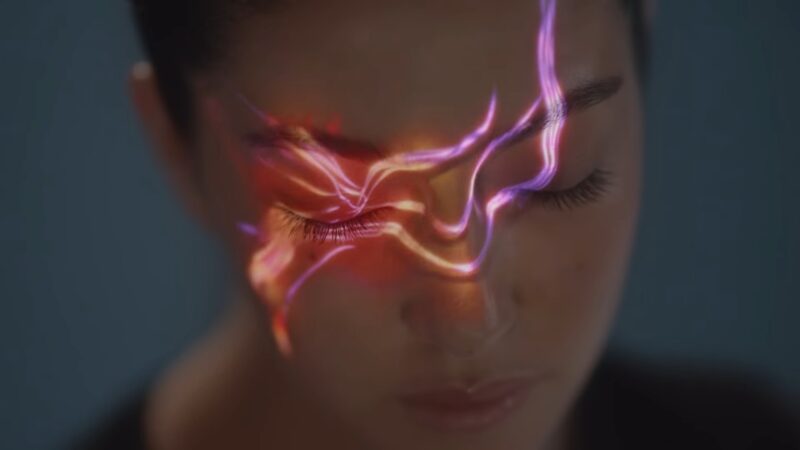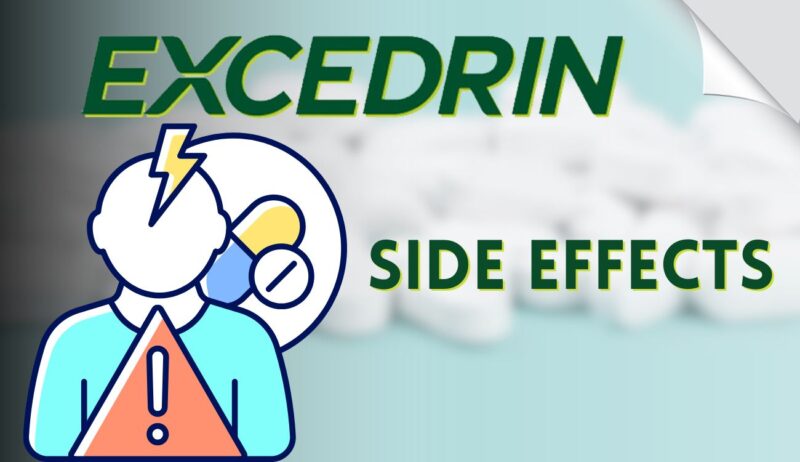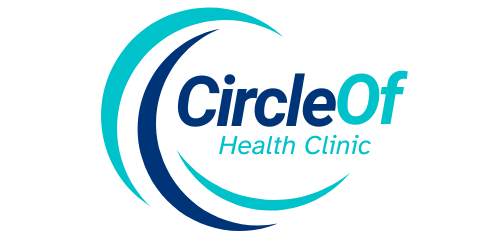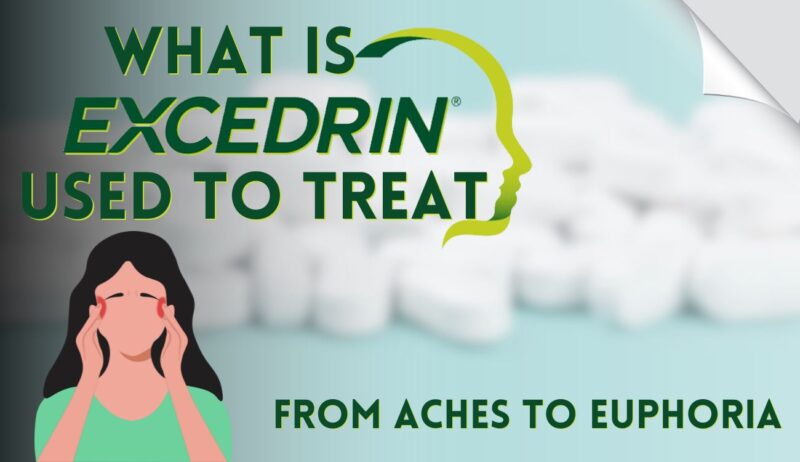Excedrin is often reached for in times of discomfort. But what exactly is it used for? It is a combination drug that contains acetaminophen, aspirin, and caffeine. It’s primarily used to treat various types of pain, including headaches, migraines, and minor body aches.
Today we’ll explore the components of Excedrin and how they work together to alleviate pain. We’ll also discuss the unique synergistic effect of these components, which makes this medicine a potent tool in pain management.
What Does It Contain?
Excedrin contains three active ingredients: acetaminophen, aspirin, and caffeine. Acetaminophen, also known as paracetamol, is a common pain reliever and fever reducer. It’s often used alone for minor aches and pains and in combination with other medications for more severe pain.
Aspirin, a nonsteroidal anti-inflammatory drug (NSAID), helps reduce pain and inflammation. It works by blocking the production of certain chemicals in the body that contribute to inflammation and pain. Lastly, caffeine, a central nervous system stimulant, enhances the effectiveness of the other two components.
Each ingredient plays a crucial role in Excedrin’s effectiveness. Acetaminophen and aspirin target pain directly, while caffeine enhances their effects and helps the body absorb the medication more quickly. This combination of ingredients provides a multi-faceted approach to pain relief, addressing different aspects of pain simultaneously.
How Does It Work?

This medicine works by targeting the areas of the brain that receive pain signals. Acetaminophen and aspirin work to inhibit the production of certain chemicals in the body that cause pain and inflammation.
They block the effects of enzymes called cyclooxygenases, which are involved in the production of prostaglandins, substances in the body that cause inflammation, pain, and fever. Caffeine, on the other hand, helps to increase the pain-relieving effects of acetaminophen and aspirin.
It does this by blocking adenosine receptors in the brain. Adenosine is a neurotransmitter that can increase the perception of pain. By blocking its effects, caffeine can help reduce the sensation of pain.
This combination of ingredients makes Excedrin a powerful tool in the management of various types of pain. However, like all medications, it should be used responsibly and as directed.
When to Use It?
Excedrin is a versatile medication that can be used to treat a variety of conditions.
Treating Headaches

One of its most common uses is for the treatment of tension headaches. These headaches are often caused by muscle contractions in the head and neck region, and the combination of acetaminophen, aspirin, and caffeine in the medicine can effectively alleviate this type of pain.
Tension headaches can be triggered by a variety of factors, including stress, anxiety, lack of sleep, and poor posture. Excedrin can provide quick relief, allowing individuals to continue with their daily activities without discomfort.
It can also be used to treat sinus headaches, which are often accompanied by pressure and pain in the cheeks, forehead, or bridge of the nose. The anti-inflammatory properties of aspirin can help to reduce the inflammation that causes these symptoms.
Sinus headaches are often associated with sinusitis, a condition where the sinuses become inflamed or infected. By reducing inflammation, Excedrin can help alleviate the pain associated with this condition.
Migraines
Excedrin Migraine is a specific formulation of the medication that is FDA-approved for the treatment of migraines. Migraines are severe headaches characterized by intense throbbing or pulsing sensations, often accompanied by nausea, vomiting, and sensitivity to light and sound.
Migraines can be debilitating, affecting an individual’s ability to perform daily tasks and reducing their quality of life. The medicine works by narrowing the blood vessels in the brain, which can help to alleviate the pain associated with migraines.
The caffeine in it also helps to increase the absorption of the other ingredients, making the medication more effective. It’s important to note that while Excedrin Migraine can help manage the symptoms of a migraine, it’s not a cure and should be used as part of a comprehensive treatment plan under the guidance of a healthcare provider.
This medication can also help with a few other conditions:
Arthritis
While not as potent as some prescription medications, Excedrin can help manage minor pain associated with arthritis.
Muscular Aches
Overexertion, minor injuries, or other causes of muscle pain can be managed with Excedrin.
Menstrual Cramps

The acetaminophen and aspirin in the medication can help alleviate the pain of menstrual cramps.
Toothaches
For minor toothaches, it can provide temporary relief until dental treatment can be obtained.
Fever
The acetaminophen in Excedrin can help reduce fever. For those seeking relief from cold and flu symptoms, there are other common remedies, such as this popular over-the-counter medication, that can help alleviate discomfort.
Side Effects

Like all medications, Excedrin can have side effects.
Common Side Effects
Some common side effects of Excedrin include upset stomach, heartburn, and nervousness. These side effects are generally mild and go away on their own as your body adjusts to the medication. Upset stomach and heartburn can be minimized by taking the medicine with food or milk.
Nervousness is often related to caffeine content and can be managed by reducing caffeine intake from other sources. However, if these side effects persist or worsen, it’s important to seek medical attention.
It’s also important to remember that not everyone who takes this medicine will experience these side effects. Each individual’s reaction to medication is unique, and many people use it without experiencing any adverse effects.
Serious Side Effects
While rare, Excedrin can cause serious side effects in some individuals. These can include allergic reactions, bleeding or bruising, hearing changes, and mental/mood changes. Allergic reactions can manifest as rash, itching, swelling, severe dizziness, or trouble breathing.
If you notice any signs of an allergic reaction, it’s crucial to seek immediate medical attention. Bleeding or bruising, hearing changes, and mental/mood changes are also serious side effects that require immediate medical attention.
It’s also important to remember that the risk of serious side effects is generally low, and most people who take the medicine do so without any issues. However, if you have any concerns or experience any unusual symptoms while taking it, it’s always best to consult with a healthcare provider.
What’s the recommended dose?
The recommended dosage for Excedrin varies depending on the specific product and the age of the person taking it.
| Product | Age | Active Ingredients per Tablet | Dose |
|---|---|---|---|
| Excedrin Extra Strength | 12 Years & Older | Acetaminophen (250 mg), Aspirin (250 mg), Caffeine (65 mg) | 2 Every 6 Hours (Max. 8 Per Day) |
| Excedrin Migraine | 12 Years & Older | Acetaminophen (250 mg), Aspirin (250 mg), Caffeine (65 mg) | 2 Every 6 Hours (Max. 8 Per Day) |
| Excedrin Head Care Support | 18 Years & Older | Acetaminophen (250 mg), Aspirin (250 mg), Caffeine (65 mg) | 2 Per Day (Max. 2 Per Day) |
| Excedrin Tension Headache | 12 Years & Older | Acetaminophen (500 mg), Aspirin (250 mg), Caffeine (65 mg) | 2 Every 6 Hours (Max. 6 Per Day) |
| Excedrin PM Headache | 12 Years & Older | Acetaminophen (250 mg), Aspirin (250 mg), Diphenhydramine (38 mg) | 2 Per Day (Max. 2 Per Day) |
Frequently Asked Questions (FAQs):

What should I avoid while taking the medicine?
Avoid drinking alcohol. Alcohol may increase your risk of stomach bleeding while taking aspirin, or liver damage while taking acetaminophen. Avoid taking another NSAID (nonsteroidal anti-inflammatory drug) such as aspirin, ibuprofen (Advil, Motrin), naproxen (Aleve), celecoxib, diclofenac, indomethacin, meloxicam, and others.
Avoid coffee, tea, cola, energy drinks, or other sources of caffeine while taking this medication. They can add to the side effects of the caffeine in the medication.
What happens if I miss a dose of Excedrin?
Since Excedrin is used when needed, you may not be on a dosing schedule. If you are on a schedule, use the missed dose as soon as you remember. Skip the missed dose if it is almost time for your next scheduled dose. Do not use extra medicine to make up for the missed dose.
Are there any warnings?
Yes, Excedrin should not be given to a child or teenager with a fever, flu symptoms, or chicken pox as aspirin can cause Reye’s syndrome, a serious and sometimes fatal condition in children. Overdose of acetaminophen can damage your liver or cause death.
Aspirin may cause stomach or intestinal bleeding, which can be fatal. In rare cases, acetaminophen may cause a severe skin reaction.
Can it be used during pregnancy or while breastfeeding?
Aspirin, a component of this medicine may be harmful to an unborn baby’s heart, and may also reduce birth weight or have other dangerous effects. It’s important to tell your doctor if you are pregnant or plan to become pregnant while you are taking it.
Aspirin, acetaminophen, and caffeine can pass into breast milk and may harm a nursing baby. You should not breastfeed while using Excedrin.
Conclusion
Excedrin is a versatile and effective medication for treating a variety of pain-related conditions. Its combination of acetaminophen, aspirin, and caffeine provides a multi-faceted approach to pain relief, making it a popular choice for many individuals.
Whether you’re dealing with a tension headache, a migraine, or minor body aches, this medicine can provide relief and help you get back to your daily activities. However, be careful with its usage and consult with a healthcare professional if you have any questions.

